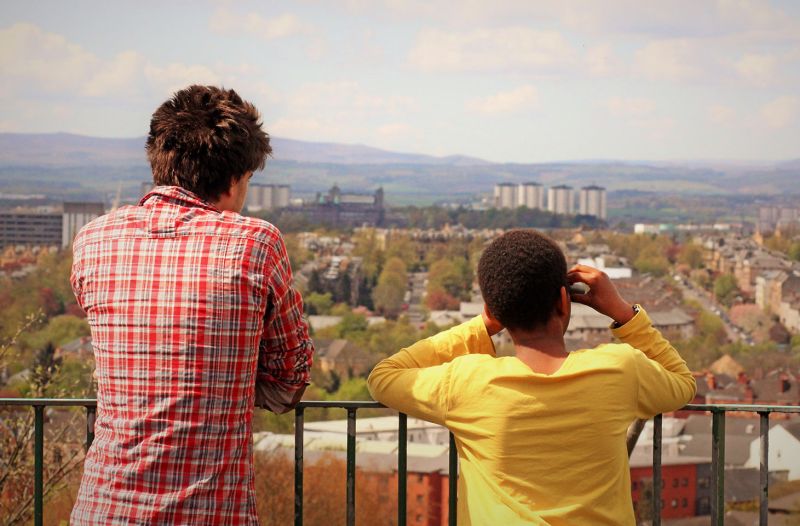 This unusual production pairs one adult audience member with a primary-school-aged child from the city, and has been created by Andy Field in collaboration with the students and staff of Sefton Park Junior School.
This unusual production pairs one adult audience member with a primary-school-aged child from the city, and has been created by Andy Field in collaboration with the students and staff of Sefton Park Junior School.
I no longer live in Bristol and this visit was one of the few times I’ve ever been left feeling nostalgic about it. Brandon Hill is at its most beautiful at this time of year (even in the drizzle). The view over the cityscape, right over the docks, out towards the mouth of the Avon, is spectacular, and added to this, the whole place is singing with flowers and birdlife. After a while I understand that this outdoor event is not simply about being able to be outdoors now that it’s (almost) summer. Lookout carries an ecological message. We ‘look out’ over the landscape and we need to ‘look out’ for the future of a city whose green spaces and relative opulence provide an almost perfect mix for urban living.
Lookout is an event that gives small audiences a half hour introduction to possible futures. On entering the park we were greeted by Andy who hands us a small portable recording to be listened to, individually, at places where the view was the most far reaching. At first, music and then a child’s voice speaks: ‘Hello, my name is Frank, and I’m 49 years old.’ The voice goes on to describe something very different from the view I’m actually looking at. Allotments created of necessity cover the parkland (as they must have done during the war). Massive radar dishes funnel the heat of the sun and create local weather conditions; the views are gone, buried under high rise housing developments. The voice stops and a real child’s voice takes my attention: ‘Hello, I’m Frank and I’m seven years old.’ Frank then outlines the format of the exchange; he asks me three questions. ‘Do I think I will be alive in 60 years’ time?’ He is unflinching but the point has been made – how do I see the future of this place? And, how would I feel about its loss of it as a place of beauty? But is there also an assumption, in Frank’s script, that audience are part of the ‘I won’t be around so I don’t care’ club? That only by knowing we will witness the devastating changes that will occur if real environmental protection doesn’t speed up, will we care about and actively support change?
As the first exchange ends I listen to another recording: ‘Hello, I’m Frank and I’m 69 years old.’ Frank is standing beside me looking at the view though a pair of toy binoculars until it’s time to talk again. Then other voices, that offer other futures, feature interesting proposals such as the abolition of money, the teaching and learning of gymnastics for all from an early age– thus making the ‘need’ for acrobats redundant. Finally Frank asks for, and takes careful note of, some things I would ask for from the government. I don’t know what he will do with my replies. I don’t ask. There is no formal ending, he walks away. The recording turns to music and then ends.
The exchange has been smoothly mediated and I need to reflect hard on what I’ve contributed to. The introduction of a listening device was key because, as with other forms of theatre, we have been trained to listen but in ordinary encounters, in public areas, there are no particular definitions to the space or focus of attention.
Andy Field’s work always focuses on the reimagination of everyday behaviours and this commission from Mayfest builds on that trope and his history of making interactive work. The levelling of adult and child in this piece is exceptionally simple and clever. I overhear a member of the audience saying that the kids are ‘sweet’, but they’re not. They are on the same level as the adults in this exchange (only more imaginative) and the familiar, simple interaction at the heart of this piece nevertheless exerts a complex effect. Frank was an actual child and a ‘character’, he played a part, as did his peers with other audience members, and each was both real and symbolic, universal children. This strangeness created a beneficial distance that validated and gave an equal weight to the ideas of both parties. It’s a concept piece that could be used to powerful affect in many other cities and may, I hope, be repeated when Frank is 69.

